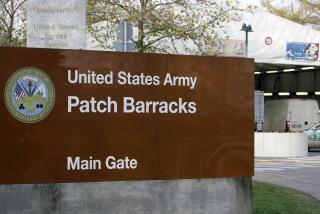Renewed Caution in Middle East
- Share via
Middle East
Citing threats made by Hezbollah and other extremist groups, the State Department this month said it “cannot discount the possibility of random acts of anti-American violence” and advised U.S. citizens in the Middle East “to exercise greater than usual caution.” The department added, however, that it knows of no specific threats to American interests. Following Israeli attacks aimed at terrorist sites in Lebanon, a news agency quoted the Iranian-backed Hezbollah as saying it plans to strike “tourist establishments, and economic and military settlements” in northern Israel. Meanwhile, Israel’s military intelligence chief told Reuters news agency that Hezbollah may also hit Israeli or Jewish targets outside Israel.
Egypt: Warning tourists to stay away from Egypt, a Muslim militant group claimed responsibility for the bloody attack that left 18 Greek visitors dead outside a suburban Cairo hotel near the Giza Pyramids on April 18. A statement from the organization, known as the Islamic Group, said the attack, which also wounded 16 Greeks and an Egyptian taxi driver, was intended for Israeli tourists who often stay in the same hotel. The Times’ foreign correspondent, William D. Montalbano, noted that although attacks on foreigners draw wide attention outside Egypt, fewer than 10 tourists had been killed before this incident. The State Department, in a measured response, described the attack and noted that no Americans were killed or injured, but stopped short of suggesting that Egypt might be hazardous for American visitors.
Security abroad: If you travel where anti-American terrorism is considered a possibility, here are some suggestions from the State Department’s Bureau of Consular Affairs:
* Avoid obvious terrorist targets and places where Americans and Westerners are known to congregate.
* Be aware of what you discuss with strangers or what may be overheard by others.
* Watch for people following you or loiterers observing your comings and goings.
* Discuss with your family what they would do in case of an emergency.
South America
Colombia: The recent murders of two Americans reinforced Colombia’s image as a violent country. According to the U.S. Embassy in Bogota, an American man was killed during an altercation at a party in a western Colombia town, and an American woman was shot to death by an unidentified gunman while riding a bus in the Caribbean port of Barranquilla. The motive in each case was unknown. Long tagged by the State Department as a country that Americans should avoid for their safety, Colombia for the last five years has had one of the world’s highest murder rates--76 per 100,000 people. About 31,000 people died violently there last year.
Briefly . . .
Nepal: The U.S. Embassy warned Americans of a rash of political violence in recent weeks that has included beatings, arson and murder. Noting that few of the incidents have occurred in tourist areas, the announcement advised travelers to register with the embassy’s consular section on arrival.
Turkey: A Kurdish rebel leader told Reuters that his guerrillas will bomb tourist sites this summer if the Turkish government does not halt its offensive against the rebels. “The tourist locations are, for us, the most important war zones,” the leader said. “I warn tourists of all nationalities not to visit Turkey.”
South Africa: The safety of tourists cannot always be guaranteed, warned the country’s deputy tourism minister. While attacks on tourists are rare, some Johannesburg hotels offer guards for guests willing to brave the streets.
Guatemala: Kidnappings for ransom have soared recently. A 64-year-old American teacher was abducted last month by four gunmen outside her Guatemala City home, then freed the next day. Earlier, a 70-year-old American businessman was kidnapped in the southern province of Santa Rosa, then quickly released.
Hot spots: The State Department has dropped North Korea from its list of places where Americans are warned not to travel. Remaining on the list are Afghanistan, Algeria, Angola, Bosnia-Herzegovina, Burundi, Colombia, Guatemala, Iran, Iraq, Lebanon, Liberia, Libya, Nigeria, Rwanda, Sierra Leone, Somalia, Sudan and Tajikistan.
The U.S. State Department offers recorded travel warnings and advisories at (202) 647-5225; the fax line is (202) 647-3000.
More to Read
Sign up for Essential California
The most important California stories and recommendations in your inbox every morning.
You may occasionally receive promotional content from the Los Angeles Times.













